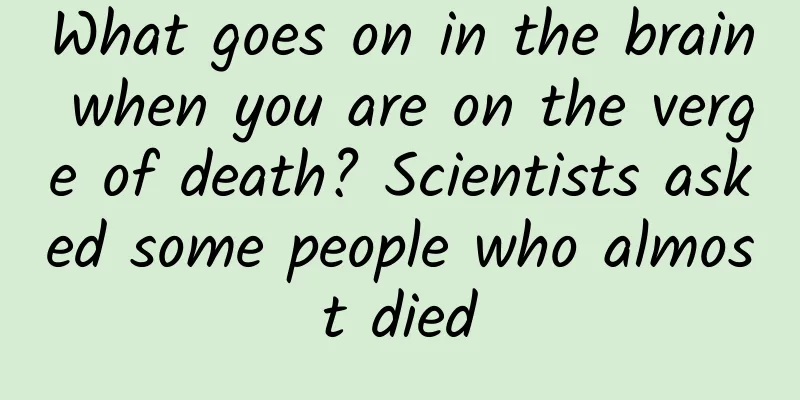What goes on in the brain when you are on the verge of death? Scientists asked some people who almost died

|
Some people who have cardiac arrest experience bursts of brain activity during cardiopulmonary resuscitation (CPR) that may be a sign of a "near-death experience." What happens when we actually die—does our hearts stop beating and our brain waves flatten out? Humans have been searching for answers to this question since ancient times. But it's difficult because the dead usually can't tell us about their experiences. While religious texts offer a variety of explanations, scientists have been working to find their own answers, and they've made some progress in understanding the brain's transition from life to death. Image source: pixabay Recalling the Death Experience A study recently monitored the brains of people who were dying, and some of them were able to recall their experiences on the brink of death. According to the results, published September 14 in the journal Resuscitation, some cardiac arrest patients' flat EEGs suddenly became active during CPR—even though their hearts had stopped beating for up to an hour. A small number of surviving study participants were able to recall the experience, and one patient was able to identify the recording that was played as doctors resuscitated him. The researchers interpreted the brain recordings from these patients as a sign of "remembering the death experience" - "something that has never been observed before," said lead author Sam Parnia, an associate professor of medicine at NYU Langone Health who has long studied the human dying process. "We have also been able to come up with a coherent, mechanistic explanation for why this happens," he said. For accuracy, Parnia prefers the term "recalled experiences of death " rather than "near-death experiences," a term that has been reported in historical records from different cultures. Some Western scientists previously dismissed these experiences as hallucinations or dreams, but recently some research teams have begun to take them more seriously as a means of studying consciousness and revealing new insights into death. In the new study, Parnia and his colleagues sought to identify biological markers of a "recalled death experience." They worked with 25 hospitals, primarily in the United States and the United Kingdom, to measure brain oxygen levels and electrical activity in patients who were admitted to emergency rooms for cardiac emergencies using lightweight devices that did not interfere with treatment. The researchers also tested the patients' conscious and unconscious perception: they put headphones on the patients and repeatedly played the names of three fruits: "banana," "pear," and "apple." Parnia explained that a person may not remember hearing the names of these fruits, but when asked to "think of three fruits at random," he may still give the correct answer, which is unconscious learning. Past studies have shown that even people in a deep coma can unconsciously remember the names of fruits or cities whispered in their ears. Image source: pixabay Between May 2017 and March 2020, 567 patients experienced cardiac arrest in hospitals working with the researchers. Medical staff collected available data on brain oxygen levels and electrical activity in 53 of those patients, most of whom had flat EEGs. But about 40% had normal or near-normal brain waves again at some point later, consistent with consciousness. This could occur even after 60 minutes of CPR. Of the 567 patients, only 53 survived. The researchers interviewed 28 of those survivors and another 126 people from the community who had experienced cardiac arrest (because the sample size of survivors in the new study was too small). Nearly 40% reported that they had some perception of the dying process, but no specific memory. 20% seemed to have a "recalled death experience." Many people who had a "recalled death experience" described the event as a "moral evaluation" of "their entire life and how they had behaved," Parnia said. The researchers found that only one survivor interviewed was able to recall the name of the fruit from the recording that was played while he was receiving CPR, but Parnia acknowledged that this person may have just guessed correctly by chance. Image source: pixabay Braking system Parnia and his colleagues offer a possible hypothesis to explain their findings. Normally, there is a "brake system" somewhere in the brain that filters out most elements of brain function from entering conscious experience - allowing people to function efficiently in real life. Because under normal circumstances, "you can't access the full range of brain activity in the conscious realm," Parnia says. The researchers' hypothesis is that in the brains of people who are dying, the "brakes" are removed. Normally dormant parts become active, so that the entire brain activity of the dying person is in the realm of consciousness - "all your thoughts, all your memories, everything that was previously in your mind comes up," Parnia said. "We don't know what evolutionary purpose this serves, but it seems to prepare people for the transition from life to death." The findings also raise questions about the brain's ability to recover from a lack of oxygen. "It's possible that some people who were traditionally thought to be unsalvageable could actually be saved," Parnia said. "Doctors traditionally believe that if the brain is deprived of oxygen for five to 10 minutes, it will die. Our study was able to show that the brain's ability to resist prolonged oxygen deprivation is quite strong. This opens up new avenues for finding treatments for brain injuries in the future ." Image source: pixabay The new study “is a huge effort to understand the nature of brain function as objectively as possible, as it might apply to consciousness during cardiac arrest and near-death experiences,” said Lakhmir Chawla, an intensive care unit physician at the Jennifer Moreno Veterans Affairs Medical Center in San Diego, California, who was not involved in the study but has published papers on spikes in EEG activity as patients die. While the results reported by Parnia and his colleagues are “astonishing” from a scientific perspective, Chawla said: “We should also think about the human implications of these data. First, the findings should encourage clinicians to treat patients undergoing CPR as seriously as awake patients, which is rarely done. Second, for patients who appear to be beyond saving, doctors can ask their family members to say goodbye because the patient may still be able to hear their voices.” References [1] https://www.scientificamerican.com/article/some-patients-who-died-but-survived-report-lucid-near-death-experiences-a-new-study-shows/ Planning and production Source: Global Science Editor: Lin Lin |
Recommend
6 major features of short video marketing promotion!
Why is short video marketing so popular? What are...
Mine, a simple yet effective naval weapon, how has it kept pace with the times?
The mine is an old naval weapon, but it is simple...
The tombstone mechanism that keeps iOS running smoothly is now available on Android!
I believe many of you have heard of the tombstone...
Who are the "superheroes" in the intestine? The "Justice League" of prebiotics and probiotics
In today's pursuit of a healthy life, the ter...
Popular Science Illustrations | What “wisdom content” does the National Library of Editions have?
...
How to deal with the H1N1 flu outbreak? Is it too late to get vaccinated now?
Although everyone has made some preparations to d...
Musk and Jack Ma's two surprising coincidences in starting a business
Tesla founders Elon Musk and Jack Ma seem to have...
When taking over a new project, how can we quickly develop a reliable operation and promotion plan?
When taking over a new project, how can you quick...
Others with 0 followers can easily get 100,000 likes on Douyin. What is Douyin’s recommendation algorithm?
Tik Tok 's decentralized algorithm gives ever...
Price inquiry for the production of Liangshan meat and poultry mini program. How much does it cost to produce Liangshan meat and poultry mini program?
There is no fixed price for the production of the...
Astronomical wonders: The Perseverance rover captured a clear and beautiful solar eclipse on Mars!
A solar eclipse on Earth is caused by the Earth&#...
Don’t ask! Milk tea is drunk in the afternoon, people go crazy at night
Who is the most popular beverage in the beverage ...
How to use new media to achieve low-cost marketing, brand promotion and operations?
Startups face many problems, such as scarce resou...
The entire process of live streaming with goods on Douyin!
In addition to the popularity of short videos, li...
The key points of KFC’s “Crazy Thursday” marketing!
A day or two ago, KFC successfully registered &qu...









